PRINCETON, NJ -- Gallup finds 64% of Americans saying gay or lesbian relations between consenting adults should be legal, the highest since it first asked the question more than 30 years ago.
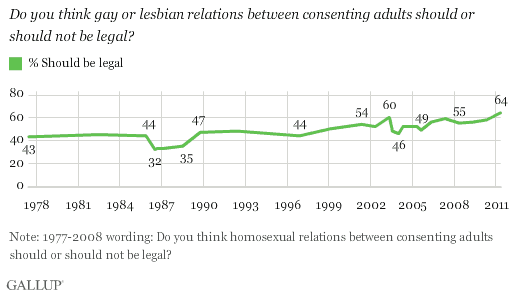
The results are based on Gallup's annual Values and Beliefs poll, conducted May 5-8.
Americans' support for legal gay relations has been as low as 32%, in 1986, but increased to 47% by 1989 and went above the majority level in 2001 for the first time. After peaking at 60% in May 2003, public support dropped that same year, likely as a backlash against a U.S. Supreme Court ruling that struck down a Texas anti-sodomy law and gave gays and lesbians new legal protections in that state. By 2006, Americans returned to the more supportive level seen previously, and generally held there until the increase this year.
Americans are somewhat less likely to consider gay or lesbian relations to be morally acceptable than to say they should be legal. However, the 56% who consider gay or lesbian relations morally acceptable is the highest Gallup has measured since this question was first asked in 2001.
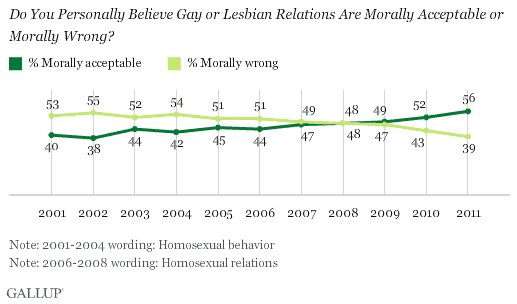
In the same poll, Gallup also finds support for gay marriage increasing to the majority level for the first time.
No Public Consensus on Origins of Same-Sex Orientation
Though public acceptance of gay and lesbian relations has increased, Americans remain divided as to the origins of same-sex orientation. Forty-two percent say being gay or lesbian is "due to factors such as upbringing and environment," while 40% believe it is "something a person is born with." Prior to 2001, Americans were more inclined to think being gay or lesbian was a product of one's environment.
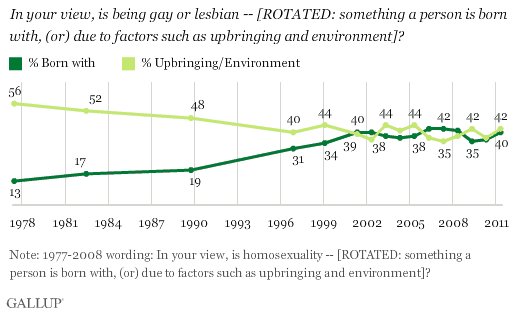
Americans who believe same-sex orientation is inherent in individuals are much more likely to support legal gay and lesbian relations, and much more likely to view them as morally acceptable, than are those who believe it has its origins in environmental factors.
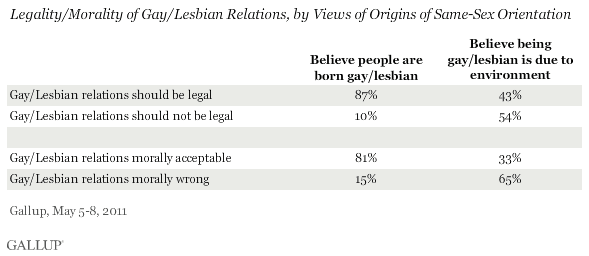
Politically, Democrats are more likely than Republicans to believe that people are born gay and lesbian, and thus are also more inclined to think gay and lesbian relations are morally acceptable and should be legal.
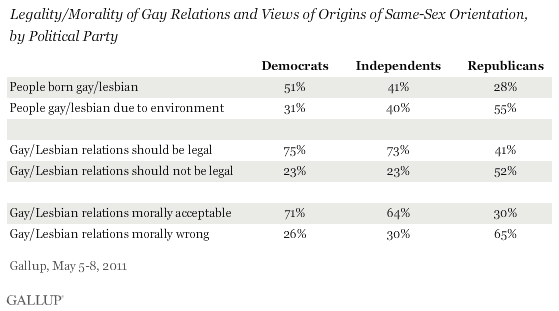
However, Americans' views on what causes gay/lesbian sexual orientation seem to be the most strongly associated with their support for gay rights. A statistical analysis of the data reveals that Americans' beliefs about the origins of same-sex orientation are much more strongly related to their views of the legality and morality of gay or lesbian relations than to party identification, ideology, religious commitment, age, and other demographic characteristics, taking all those factors into account simultaneously. The reverse is also true: those most supportive of gay rights are much more likely to believe people are born gay or lesbian than that it is a product of their environment, controlling for other attitudinal and demographic factors.
Bottom Line
Americans are now as accepting of gays and lesbians as at any point in the last three decades, if not in U.S. history. This greater acceptance extends to their views of the morality of gay and lesbian relations, of their legality, and of whether marriage should legally be granted to same-sex couples.
If the trends continue and political leaders are responsive to public opinion on the issue, one would expect more states and the federal government to expand the legal rights of gays and lesbians, including the right to legally marry.
Survey Methods
Results for this Gallup poll are based on telephone interviews conducted May 5-8, 2011, with a random sample of 1,018 adults, aged 18 and older, living in all 50 U.S. states and the District of Columbia.
For results based on the total sample of national adults, one can say with 95% confidence that the maximum margin of sampling error is ±4 percentage points.
Interviews are conducted with respondents on landline telephones and cellular phones, with interviews conducted in Spanish for respondents who are primarily Spanish-speaking. Each sample includes a minimum quota of 400 cell phone respondents and 600 landline respondents per 1,000 national adults, with additional minimum quotas among landline respondents for gender within region. Landline telephone numbers are chosen at random among listed telephone numbers. Cell phone numbers are selected using random-digit-dial methods. Landline respondents are chosen at random within each household on the basis of which member had the most recent birthday.
Samples are weighted by gender, age, race, Hispanic ethnicity, education, region, adults in the household, and phone status (cell phone only/landline only/both, cell phone mostly, and having an unlisted landline number). Demographic weighting targets are based on the March 2010 Current Population Survey figures for the aged 18 and older non-institutionalized population living in U.S. telephone households. All reported margins of sampling error include the computed design effects for weighting and sample design.
In addition to sampling error, question wording and practical difficulties in conducting surveys can introduce error or bias into the findings of public opinion polls.
View methodology, full question results, and trend data.
For more details on Gallup's polling methodology, visit www.gallup.com.
